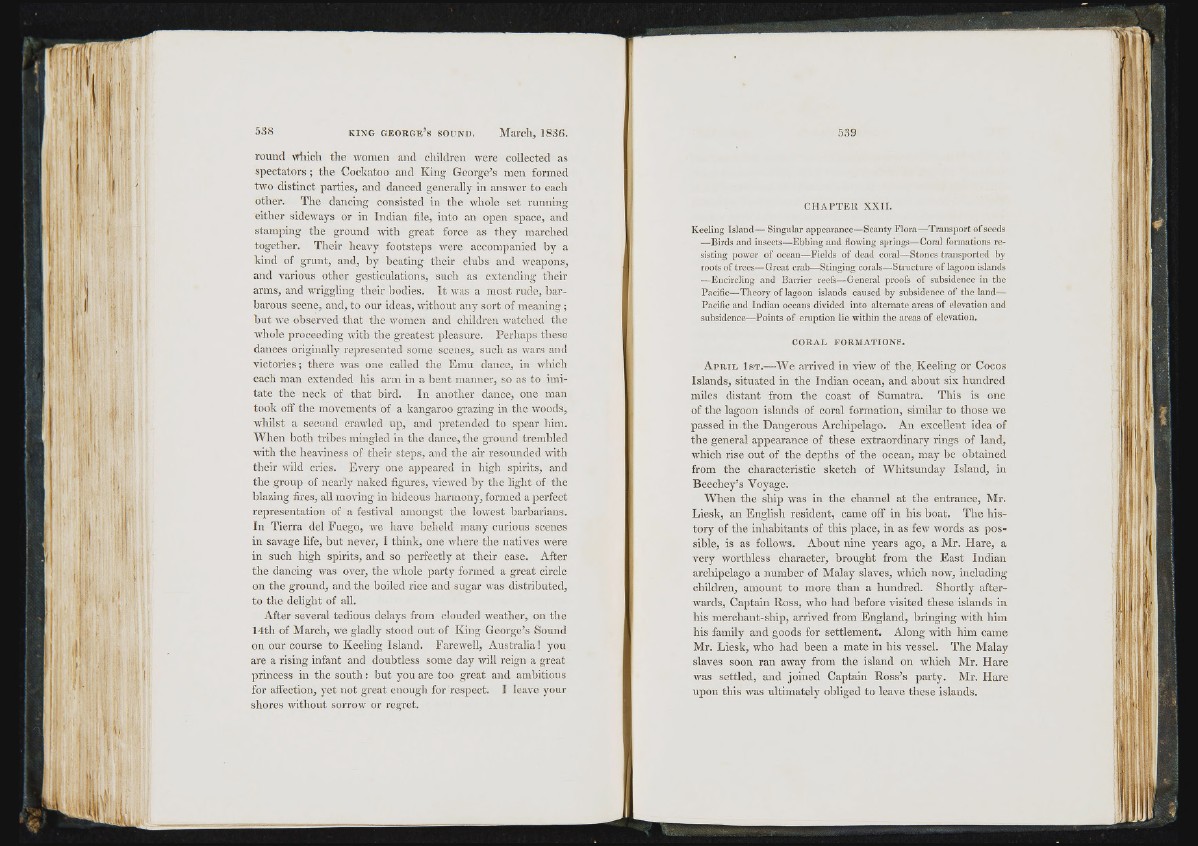
J . ■ ,1 ft
1 .
; i ; ft 'i:
T ri.'"
'K’ ■!
ift
' .ft'
■ i, i
il
, :
M. ' ft
l i "
:i <■
round \fliich the women and children were collected as
spectators; the Cockatoo and King George’s men formed
two distinct parties, and danced generally in answer to each
other. The dancing consisted in the whole set running
either sideways or in Indian file, into an open space, and
stamping the ground with great force as they marched
together. Their heavy footsteps were accompanied by a
kind of grunt, and, by beating their clubs and weapons,
and various other gesticulations, such as extending their
arms, and wriggling their bodies. It was a most rude, bar-
bai'ous scene, and, to our ideas, without any sort of meaning;
but we observed that the women and children watched the
whole proceeding with the greatest pleasure. Perhaps these
dances originally represented some scenes, such as wars and
victories; there was one called the Emu dance, in which
each man extended his arm in a bent manner, so as to imitate
the neck of that bird. In another dance, one man
took off the movements of a kangaroo grazing in the woods,
whilst a second crawled up, and pretended to spear him.
When both tribes mingled in the dance, the ground trembled
with the heaviness of their steps, and the air resounded with
their wild cries. Every one appeared in high spirits, and
the group of nearly naked figures, viewed by the light of the
blazing fires, all moving in hideous harmony, formed a perfect
representation of a festival amongst the lowest barbarians.
In Tierra del Fuego, we have beheld many curious scenes
in savage life, but never, I think, one where the natives were
in such high spirits, and so perfectly at their ease. After
the dancing was over, the whole party formed a great circle
on the ground, and the boiled rice and sugar was distributed,
to the delight of all.
After several tedious delays from clouded weather, on the
14th of March, we gladly stood out of King George’s Sound
on our course to Keeling Island. Farewell, Australia! you
are a rising infant and doubtless some day will reign a great
princess in the south: but you are too great and ambitious
for affection, yet not great enough for respect. I leave your
shores without sorrow or regret.
C H A P T E R X X I I .
K e e lin g I s l a n d— S in g u la r a p p e a r a n c e— S c a n ty F lo r a— T r a n s p o r t o f seed s
— B ird s a n d in se c ts— E b b in g a n d flow in g sp rin g s— C o ra l fo rm a tio n s re s
is tin g p ow e r o f o c e an— F ie ld s o f d e a d c o ra l— S to n e s tra n s p o r te d b y
ro o ts o f tre e s— G r e a t c ra b— S tin g in g co ra ls— S t ru c tu r e o f lag o o n isla n d s
— F in c ire lin g a n d B a r rie r ree fs— G e n e r a l pro o fs o f su b s id e n c e in tlie
P a c ific— T lie o ry o f lag o o n isla n d s c a u se d b y s u b s id e n c e o f tlie l a n d—
P a c ific a n d I n d ia n o c e an s d iv id e d in to a lt e rn a t e a re a s o f e le v a tio n a n d
su b s id e n c e— P o in ts o f e ru p tio n lie w ith in th e a re a s o f e le v a tio n .
CORAL FORMAT I ONS .
A p r i l 1s t .—We arrived in view of the. Keeling or Cocos
Islands, situated in the Indian ocean, and about six hundred
miles distant from the coast of Sumatra. This is one
of the lagoon islands of coral formation, similar to those we
passed in the Dangerous Archipelago. An excellent idea of
the general appearance of these extraordinary rings of land,
which rise out of the depths of the ocean, may be obtained
from the characteristic sketch of Whitsunday Island, in
Beechey’s Voyage.
When the ship was in the channel at the entrance, Mr.
Liesk, an English resident, came off in his boat. The history
of the inhabitants of this place, in as few words as possible,
is as follows. About nine years ago, a Mr. Hare, a
very worthless character, brought from the East Indian
archipelago a number of Malay slaves, which now, including
children, amount to more than a hundred. Shortly afterwards,
Captain Ross, who had before visited these islands in
his merchant-ship, arrived from England, bringing with him
his family and goods for settlement. Along with him came
Mr. Liesk, who had been a mate in his vessel. The Malay
slaves soon ran away from the island on which Mr. Hare
was settled, and joined Captain Ross’s party. Mr. Hare
upon this was ultimately obliged to leave these islands.
I.'''
!
11,1
l i
M
1 |